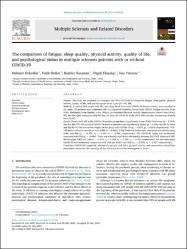| dc.contributor.author | Özkeskin, Mehmet | |
| dc.contributor.author | Özden, Fatih | |
| dc.contributor.author | Karaman, Bedriye | |
| dc.contributor.author | Ekmekçi, Özgül | |
| dc.contributor.author | Yüceyar, Nur | |
| dc.date.accessioned | 2021-08-09T13:20:34Z | |
| dc.date.available | 2021-08-09T13:20:34Z | |
| dc.date.issued | 2021 | en_US |
| dc.identifier.citation | Özkeskin M, Özden F, Karaman B, Ekmekçi Ö, Yüceyar N. The comparison of fatigue, sleep quality, physical activity, quality of life, and psychological status in multiple sclerosis patients with or without COVID-19. Mult Scler Relat Disord. 2021 Jul 31;55:103180. doi: 10.1016/j.msard.2021.103180. Epub ahead of print. PMID: 34352513; PMCID: PMC8324500. | en_US |
| dc.identifier.uri | https://doi.org/10.1016/j.msard.2021.103180 | |
| dc.identifier.uri | https://hdl.handle.net/20.500.12809/9466 | |
| dc.description.abstract | Purpose: The study was purposed to investigate the effect of COVID-19 disease on fatigue, sleep quality, physical activity, quality of life, and psychological status in people with MS.
Methods: A total of 104 people with MS, including 46 of them with COVID-19 disease history, were enrolled in the study. All patients were evaluated with the Expanded Disability Status Scale (EDSS), Fatigue Severity Scale (FSS), Pittsburgh Sleep Quality Index (PSQI), International Physical Activity Questionnaire Short Form (IPAQ-SF), the EuroQoL Instrument (EQ-5D-3L), the Fear of COVID-19 Scale (FCV-19S) and the Coronavirus Anxiety Scale (CAS).
Results: People with MS in the COVID-19 positive group had a significantly lower IPAQ-Total score (p = 0.014). Besides, the FCV-19S scores of COVID-19 positive patients were significantly higher (p = 0.006). EQ-5D-3L Index and EQ-5D-3L VAS scores were higher in the group with COVID-19 (p1 = 0.021, p2 = 0.014, respectively). FCV-19S had a moderate correlation with EDSS (r = -0.362). IPAQ-Total was moderately associated with MS duration, EDSS and FSS (r1 = -0.471, r2 = -0.389, r3 = -0.388, respectively). The EQ-5D-3L Index was moderately correlated with FSS (r1 = -0.404). There was a weakly significant relationship between EQ-5D-3L Index and BMI, MS duration, PSQI and CAS (r1 = -0.471, r2 =-0.389, r3 = -0.388, r4 = -0.326, respectively). On the other hand, EQ-5D-3L was moderately associated with VAS and EDSS and PSQI (r1 = -0.393, r2 = -0.357, respectively).
Conclusion: COVID-19 negatively affected the people with MS's physical activity and coronavirus related fear parameters. However, the causality of this influence should be investigated in detail. | en_US |
| dc.item-language.iso | eng | en_US |
| dc.publisher | Elsevier | en_US |
| dc.relation.isversionof | 10.1016/j.msard.2021.103180 | en_US |
| dc.item-rights | info:eu-repo/semantics/openAccess | en_US |
| dc.subject | Clinical status | en_US |
| dc.subject | Coronavirus disease | en_US |
| dc.subject | Multiple sclerosis | en_US |
| dc.subject | Psychological status | en_US |
| dc.subject | SARS-CoV-2 | en_US |
| dc.title | The comparison of fatigue, sleep quality, physical activity, quality of life, and psychological status in multiple sclerosis patients with or without COVID-19 | en_US |
| dc.item-type | article | en_US |
| dc.contributor.department | MÜ, Köyceğiz Sağlık Hizmetleri Meslek Yüksekokulu, Sağlık Bakım Hizmetleri Bölümü | en_US |
| dc.contributor.authorID | 0000-0001-6593-3758 | en_US |
| dc.contributor.institutionauthor | Özden, Fatih | |
| dc.identifier.volume | 55 | en_US |
| dc.relation.journal | Multiple Sclerosis and Related Disorders | en_US |
| dc.relation.publicationcategory | Makale - Uluslararası Hakemli Dergi - Kurum Öğretim Elemanı | en_US |


















